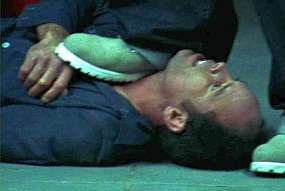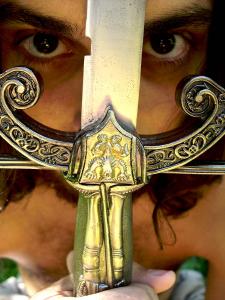The following made mistakes in their ministry and held erroneous views of God, Jesus, the Holy Spirit, the Bible, and basic Christian doctrine:
- C.H. Spurgeon
- Billy Graham
- A.W. Tozer
- John MacArthur
- Jack Hayford
- Apollos
- Amy Carmichael
- Jonathan Edwards
- Martin Luther
- George Whitefield
- John Wesley
- Gladys Alward
- David Brainerd
- C.S. Lewis
- Leonard Ravenhill
- D. Martyn Lloyd-Jones
- Peter
- George Mueller
- Watchman Nee
- Elisabeth Elliot
- John Calvin
- Dallas Willard
- John Wimber
- Hudson Taylor
And you can add to that illustrious list the name of every born-again believer who has ever lived, including you and me.
The funny thing about growing in Christ is that you don’t start from a blank slate; you start from erroneously held beliefs about the way it all works. And erroneously held beliefs don’t vanish the second someone says, “Jesus, I put my faith in you alone.”
Growing in Christ is an experiment in reaching your hand into the fire and finally realizing that fire is slightly warm. While the Holy Spirit gives believers a new set of senses that turn us on to another world, for the newest of us we are like the blind man who responded to the first portion of Jesus’ healing with “I see men, but they are like trees walking.”
The great saints listed above at some point in their Christian ministry changed their view from more worldly to more godly. None of them (or us) sprang fully formed from the head of God. If we think otherwise, then we’ve confused God with Zeus and us with Athena. Greek myths, folks. Greek myths.
Which is why I am utterly perplexed at the beat down so many young Christians receive from supposedly mature believers.  We can claim all sorts of spiritual adventures and trips to the fourth heaven that even Paul didn’t get to, but if we can’t treat with kid gloves the young believer who has a mistaken notion about some spiritual thing, then we don’t know what discipleship is all about. And rather than looking like the Lord we claim to know so well because of our eight-hour a day quiet times, we bear more than a passing resemblance to a giant, round piece of bronze beaten with a large mallet held by a guy who should lay off the Twinkies.
We can claim all sorts of spiritual adventures and trips to the fourth heaven that even Paul didn’t get to, but if we can’t treat with kid gloves the young believer who has a mistaken notion about some spiritual thing, then we don’t know what discipleship is all about. And rather than looking like the Lord we claim to know so well because of our eight-hour a day quiet times, we bear more than a passing resemblance to a giant, round piece of bronze beaten with a large mallet held by a guy who should lay off the Twinkies.
I don’t read as many Christian blogs as I used to because I got tired of the smackdowns. No one gets any theo-points from God for flaming some newbie Christian who mistakenly confused justification with sanctification. As far as the guy spewing the napalm goes, for all all he knows, he could be setting back the cause of Christ by beating down a young Christian who would otherwise go onto greater and greater ministry sooner and sooner had that newbie not incurred the wrath of a Protector of the Faith™.
And it’s not just online.
The way many new and not-yet-mature Christians are treated in our assemblies, it’s a miracle of God the gates of hell have NOT prevailed against the Church. Supposedly mature believers say all sorts of soul-crushing things to young Christians. And trust me, it sets people back. The kind of self-righteous, loveless rebuke some inexperienced believers receive is like a focused magnifying glass on a sunny day to an ant.
As a counter to that, consider one of my favorite passages of Scripture:
Now a Jew named Apollos, a native of Alexandria, came to Ephesus. He was an eloquent man, competent in the Scriptures. He had been instructed in the way of the Lord. And being fervent in spirit, he spoke and taught accurately the things concerning Jesus, though he knew only the baptism of John. He began to speak boldly in the synagogue, but when Priscilla and Aquila heard him, they took him and explained to him the way of God more accurately. And when he wished to cross to Achaia, the brothers encouraged him and wrote to the disciples to welcome him. When he arrived, he greatly helped those who through grace had believed, for he powerfully refuted the Jews in public, showing by the Scriptures that the Christ was Jesus.
—Acts 18:24-28
Apollos was good—but he wasn’t quite good enough. He didn’t see the whole picture. He didn’t have the full empowering of the Spirit. He was too raw.
But rather than verbally lashing Apollos for the inadequacies in his mostly decent theology, rather than crushing the life out of him because he had not “arrived,” Priscilla and Aquila took him aside and worked with him. Other brothers in Christ actively encouraged him and treated him as they themselves would wish to be treated.
And the result was worth waiting for. Folks would not have been saying, “I am of Apollos” (1 Cor. 1:12), if Apollos had not finally come into his own as he grew in favor with God and walked that journey from good to great.
Our transitions from sinners to saints is not a clean, clear-cut process. If you’ve been a Christian long enough, the one reality that comes out is that discipleship is messy. Your walk is a mess and so is mine.
But we can’t look at our own mess and excuse it, especially if we are looking at someone else’s and shrieking, “Man, what a disaster you are!”
Log and speck, right?
So what is the deal with beating down the newbies?
Here are a few suggestions I pray we can all consider or practice with believers who don’t have their Christian walk together yet:
Always lead with love. Always.
Consider that Jesus uttered The Golden Rule for a reason.
Start with encouraging a young Christian in what he or she is doing right.
Keep praying that God would take that young Christian from one degree of glory to the next.
When considering confronting a raw, young Christian, pray that God would do an inner confrontation in that youngster by His Holy Spirit first. Later, if the Spirit should reveal a need to partner with Him in offering gentle removal of specks, do so only after removing one’s own logs.
NEVER correct unless willing to work alongside the young Christian to help him or her reach maturity. If unwilling to partner with that immature believer, then find others who will and leave the correction to them.
Remember that if a young Christian is truly walking with the Lord, then God will not fail to complete His work, no matter how rough things appear at the moment.
And remember: You and I started out rough, too.
Did I mention to always lead with love?
The world is full of beat downs of people who don’t quite have it right. We live in merciless times among smug people who think they know it all.
But that can never be the Church of Jesus Christ. If anything, our love and mercy should always go out to the tenderest among us.

 , where would the Church universal be today?
, where would the Church universal be today? Simple people often work simple jobs also, the kind that don’t get them a cover story on Business Week. Simple people who farm the land or work as greeters at WalMart aren’t the ones that churches push front and center when the photo op comes; they’ll choose the captain of industry with the Harvard M.B.A. And when Christian publishers fight to place another Christian Living bestseller on the top shelf of the local bookstore, they’re not beating down the doors of the old waitress at Denny’s, no matter what 50 years of walking close to the heart of Jesus has taught her. No, they want legitimacy, the kind found in clobbering home runs, or running a megachurch empire, or having once been a cohost on The 700 Club.
Simple people often work simple jobs also, the kind that don’t get them a cover story on Business Week. Simple people who farm the land or work as greeters at WalMart aren’t the ones that churches push front and center when the photo op comes; they’ll choose the captain of industry with the Harvard M.B.A. And when Christian publishers fight to place another Christian Living bestseller on the top shelf of the local bookstore, they’re not beating down the doors of the old waitress at Denny’s, no matter what 50 years of walking close to the heart of Jesus has taught her. No, they want legitimacy, the kind found in clobbering home runs, or running a megachurch empire, or having once been a cohost on The 700 Club.